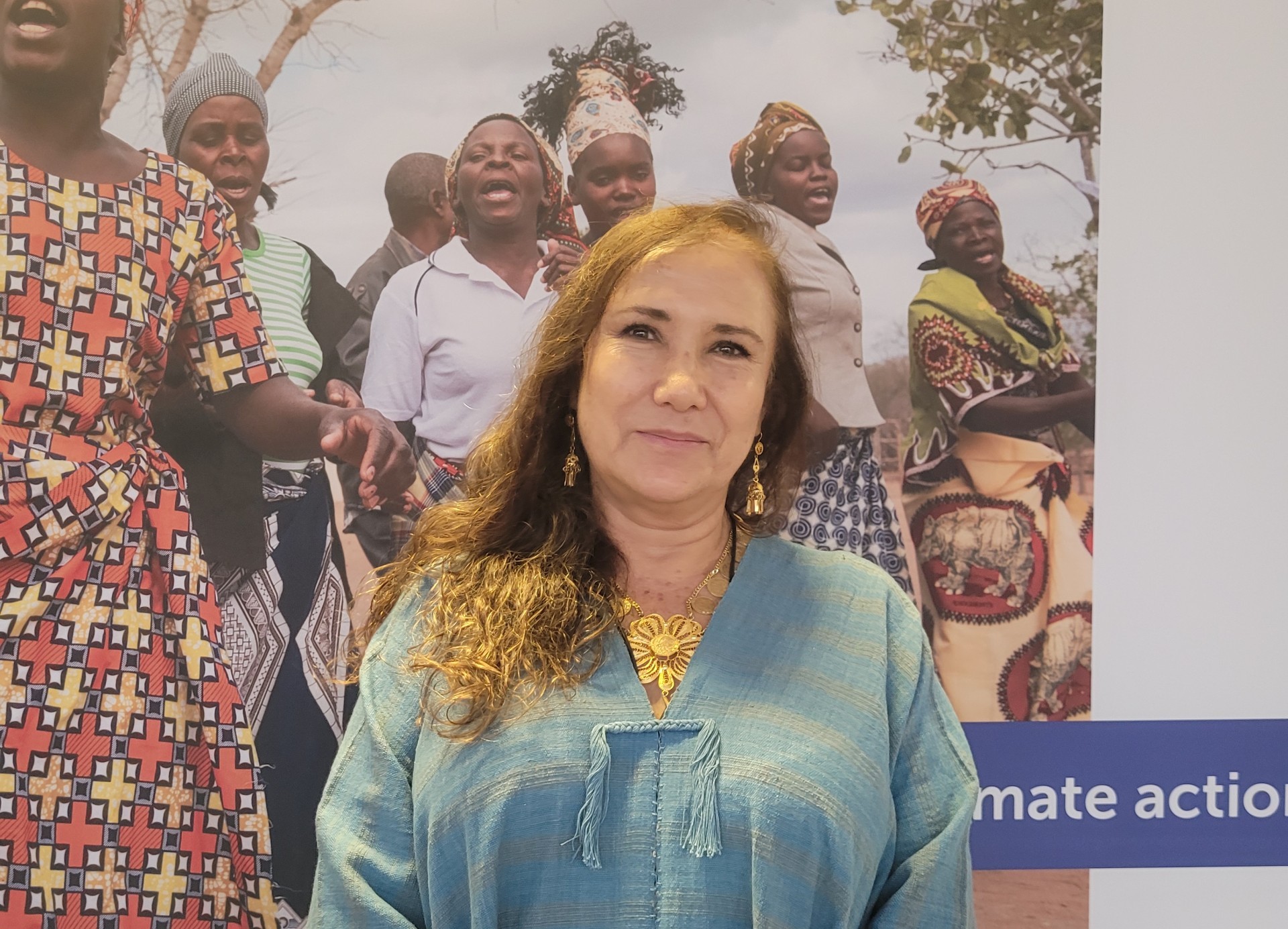Tzinnia Carranza, General Coordinator of Espacio de Encuentro de las Culturas Originarias, Mexico
Adaptation Fund Climate Innovation Accelerator Grantee Wins Local Adaptation Champion Award at COP28
Dubai, United Arab Emirates (December 10, 2023) – A local organization in Oaxaca, Mexico that helps highly vulnerable indigenous communities adapt to climate change through inspiring, innovative and locally led adaptation (LLA) solutions on the ground was among just four winners of the Global Center on Adaptation (GCA) Local Adaptation Champions awards announced during the COP 28 climate change conference here.
It marked just the second year of GCA promulgating the awards, with the winners selected from a group of over 500 applicants – doubling the number received for the inaugural awards last year.
Espacio de Encuentro de las Culturas Originarias won in the Capacity Building category for its innovative eco-technologies and knowledge sharing at the local level to strengthen adaptation capacity and help vulnerable communities in Oaxaca adapt and build resilience to frequent droughts, frosts, cyclones and other climate change challenges. Exacerbating those challenges was a lack of adaptation capacity in these low-income marginalized communities with a high rate of single mothers who are often unable to access important climate information due to language and other barriers.
Espacio’s overall program that was recognized includes a project funded by the Adaptation Fund (AF) and implemented by UNDP under the Adaptation Fund Climate Innovation Accelerator (AFCIA) partnership — which pilots innovative adaptation projects on the ground for vulnerable local communities and is open to a wide range of stakeholders, from women’s and youth groups to indigenous communities, NGOs, the private sector and local governments, among others.
The AFCIA-funded project carried out by Espacio is adopting traditional ancestral practices of fog catching to address water scarcity, and waru waru techniques to protect crops from frost.
Fog catching uses a fine mesh that retains water on foggy nights in a reservoir, while waru waru enables soils to retain thermal energy through a network of embankments and watercourses that enhance moisture levels. The project included creation of 35 fog collectors and 90 waru waru systems. It was replicated in additional areas and strengthened women’s leadership through capacity building trainings.
Espacio’s General Coordinator Tzinnia Carranza said the key to project success has been active community participation from early on in needs assessment and project identification, to planning, implementation and sustaining impacts.
Carranza said during an awards ceremony at COP28 that Espacio’s programs have benefited 15,000 people, including many women and children, employing a variety of innovative eco-technologies to save water, enhance sanitation, reduce pollution and firewood use while enhancing health. She said they use materials sustainably from the region itself and adapt the techniques to the local culture while teaching the community to create and sustain them directly.
The ancestral techniques used in this project were derived from those used in Peru and Ecuador, as other alternative solutions were too complicated and expensive to implement, explained Carranza.
“The community and people are very happy, that is the most important thing,” Carranza said. “It’s very easy to replicate, and very effective, and very easy to teach other people how to do it. People who learn the technique can bring the knowledge to others.”
AF Head Mikko Ollikainen said the project is a great example of what was envisioned when AFCIA was created. “I congratulate Tzinnia and Espacio’s work in Mexico for the most vulnerable communities. This is exactly the kind of project we had in mind with AFCIA, in taking innovation a step further in adaptation and broadening access to a wide range of organizations with the goal of creating a larger base of proven locally led and innovative projects that are scalable and can accelerate and create wider change to help keep pace with growing global adaptation needs,” he said.
The AF served on the awards selection committee for the Business Solutions category and also is providing a contribution toward the prizes for the four winners, which will include sponsoring their attendance in some of the Fund’s global learning and sharing events in the coming year.
“We were honored to participate in the process, and pleasantly surprised to learn that Espacio de Encuentro de las Culturas Originarias, whose program had received AFCIA support, had been nominated and won for this work,” said Saliha Dobardzic, who leads the Programming and Innovation at the Adaptation Fund. “We look forward to facilitating knowledge exchanges among the winners with these amazing projects and all our national implementing entities at the Adaptation Fund’s readiness events over the next year. The experience in LLA that these champions bring is something that many of our partners can benefit from as they delve deeper in designing and implementing LLA initiatives for their own communities.”
AFCIA was launched under the Fund’s Innovation Facility in 2020 to help speed piloting and scaling up of innovative adaptation projects developed by a broad range of stakeholders. It is a partnership between the AF, European Union, UNDP, UNEP-CTCN, UNIDO, and WFP. A recorded event held earlier at COP28 on the occasion of the addition of UNIDO and WFP to the partnership featured remarks on several examples of AFCIA’s successes on the ground to date.
The project in Mexico was granted funds as part of UNDP’s first round of AFCIA funding in April 2022.
______________________________________
ABOUT THE ADAPTATION FUND
Since 2010, the Adaptation Fund has committed over US$ 1 billion for climate change adaptation and resilience projects and programmes, including 164 concrete, localized projects in the most vulnerable communities of developing countries around the world with over 43 million total beneficiaries. It also pioneered Direct Access and Enhanced Direct Access, empowering countries to access funding and develop local projects directly through accredited national implementing entities.
Communications: Matthew Pueschel, mpueschel@adaptation-fund.org or +1-202-473-6743
Attachments
| Attachment | Type | Size |
|---|---|---|
| Press Release, December 10, 2023 | 139 KB |


